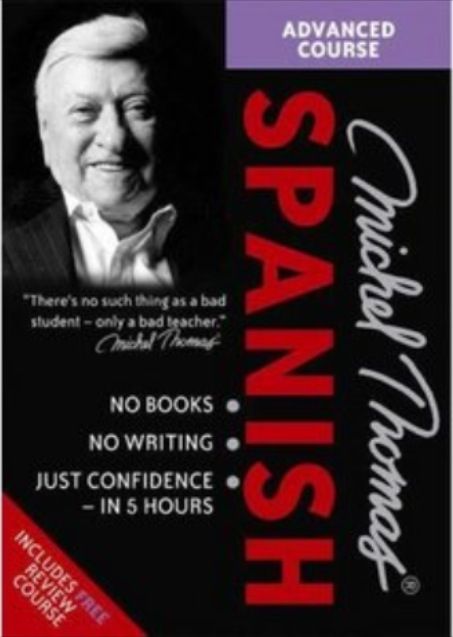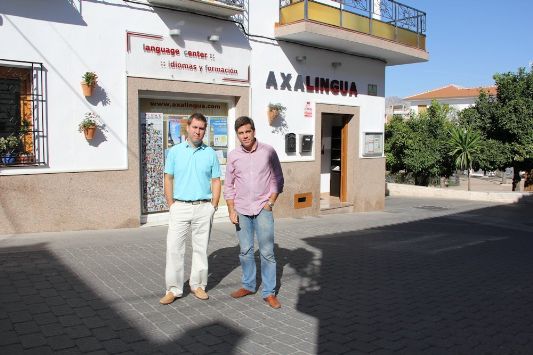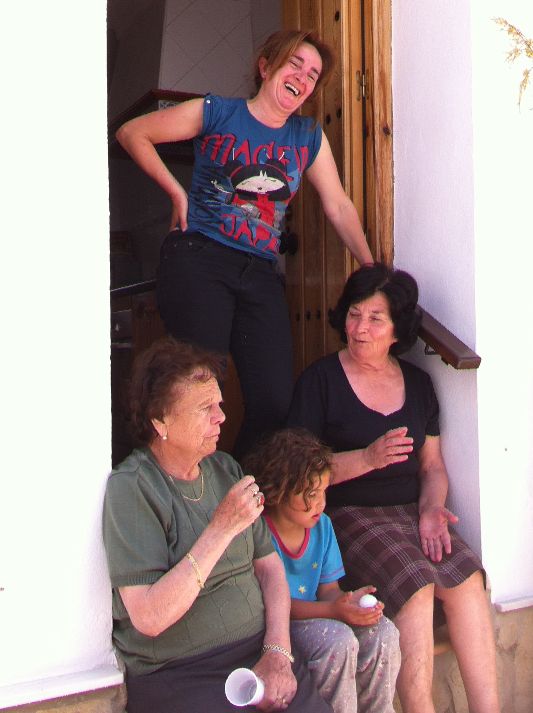The way I hear it, there are three Spanish languages. And no, I'm not talking about Castiliano, Catalan and Valenciana. Anyway if I was, it'd be a longer list. No, I'm talking about what they don't tell you when you start learning a language.
 Three Spanish languages. All different.
Three Spanish languages. All different.
First - the Spanish on my CDs and all those helpful Learning Zone programmes on at 4am on BBC2. Happy smiling people speaking slowly and clearly, choosing straightforward words, and avoiding "street" colloquialisms. My intercambio (language exchange) partner also speaks this way, though of course only with me. Most importantly, they separate each word from the next. I understand, I participate, and I feel I am making progress.
 Second - the Spanish spoken to me ONLY by Juan-Mi at the Axalingua language school in Colmenar. He speaks as clearly as the first group, but at normal speed. "Normal" in this context means at full, machine-gun, top speed, apparently making no allowances for my student status. "Juan-Mi, por favor, un poco más despacio!" I plead in vain - a little more slowly please! He refuses, every time, pointing out (with an annoying degree of truth) that there is no point him teaching me "slow" Spanish as that does not exist outside the school building. I sigh, and struggle on. Progress feels slower when the language goes faster.
Second - the Spanish spoken to me ONLY by Juan-Mi at the Axalingua language school in Colmenar. He speaks as clearly as the first group, but at normal speed. "Normal" in this context means at full, machine-gun, top speed, apparently making no allowances for my student status. "Juan-Mi, por favor, un poco más despacio!" I plead in vain - a little more slowly please! He refuses, every time, pointing out (with an annoying degree of truth) that there is no point him teaching me "slow" Spanish as that does not exist outside the school building. I sigh, and struggle on. Progress feels slower when the language goes faster.
Third - the Spanish ACTUALLY spoken in the streets of my village. Rapid, a stream of consciousness, words merging and pouring forth in an incomprehensible torrent of sound. My neighbours are kind, and slow down to speak to me. But the pronunciation is specific to the locality, as of course is the case anywhere.
"Me voy pa peccao," announced my neighbour's mother. Peccao, pronounced Pe'Cow. "Uh-huh," I reply, trying not to look blank. "Te gusta peccao?" she asked. How do I know if I like it? I've never heard of it. "Que es?" I ask her. She looks appalled. "No entiendes peccao? No puede ser!" You don't understand peccao? I don't believe it! We walk companionably along the street, divided by language. We stop outside the shop that doesn't look like a shop but sells fish in the mornings. "PECCAO" she bellows. Light dawns. "Pescado?" I ask, tentatively? "Si, si, peccao" she repeats. Her face says it - this extranjera is not too bright.
 The other night as the cool air percolated down our little street and the kitchen chairs came out to balance precariously on the slope, she repeated the story to the other women. They laughed at me and added a string of abbreviated words to the list. Andao? Andado. Pagao? Pagado. Comprao? Comprado. Someone asked where Candelaria was. "Eta enca" came the reply. "Está en casa".
The other night as the cool air percolated down our little street and the kitchen chairs came out to balance precariously on the slope, she repeated the story to the other women. They laughed at me and added a string of abbreviated words to the list. Andao? Andado. Pagao? Pagado. Comprao? Comprado. Someone asked where Candelaria was. "Eta enca" came the reply. "Está en casa".
So at night under the moon they teach me the language of the barrio, Spanish as she is really spoken. Next day in front of mi profe Juan-Mi I try out my new words, but I use the accent of the language school, the accent of Madrid. Progress, the coming together of all the strands of learning.
Another night Candelaria brings her chair to join us. She has an accent "thick enough to spread on toast" as Zafón wrote. She is kind to me, checks up on me, notices my brief visits back to England. "Are you here?" she invariably asks on my return. My "yes" seems inadequate, stating the obvious. Is the question somehow deeper than that? It's hard to ask what it is she really wants to know - my kindest neighbour, but kept distant by my lack of understanding.
Recently I met a friend inland a ways. Fluent to the point of teaching Tai-Chi in Spanish to Spaniards, he is comfortably a part of his adopted country. But just sometimes, he says, the one old chap in his street, the one that's really quite hard to understand, can feel like an effort too great to make. Guiltily, occasionally, he greets him with a quick "Buena!" and trots on by ensuring there is no opportunity for a slow and frustrating conversation. Sometimes, even when neighbours are kind, the effort feels too great. I share his guilt. I know, I too, have occasionally moved on quickly to avoid a question or a chat.
So Juan-Mi can teach me to avoid slang, colloquialisms, the language of the street. But the summer nights in the Rincón under the moonlight give me many things. Language, neighbours, friends, a sense of inclusion. And if Juan-Mi sighs when my accent slips towards Andaloo - well, so be it. It's our barrio and we'll eat peccao if we want to.
© Tamara Essex 2013
THIS WEEK’S LANGUAGE POINT:
Well, between a few of us we seem to have cracked the problem of "Se me da mal cocinar". I may not explain this very well, but it seems that we need the "Se" in this construction because the thing that goes badly is a verb. To cook. OR ... a noun that is acting as a replacement for a verb eg "Se me da mal la cocina" does not mean the kitchen is bad for me, but cooking. It's when it is some sort of activity. Similarly, "Se me dan mal las matematicas" is using the noun for maths, but as a replacement for the activity of DOING maths.
So as far as I can see, the "Se" is because it is sort of a reflexive verb ..... IT ( the cooking or the maths) is giving it bad to me. "Se me da mal cocinar" or "Se me da mal la cocina".
Not sure how clear that is as an explanation, but it had helped me get it clearer in my head. And now I have a bit of a reason for why it is the way it is, I can set that aside and just try and remember to use it!